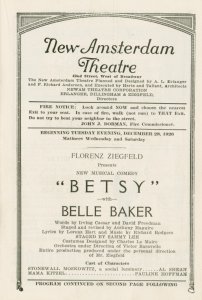Pas de biographie disponible.
Compositeur Musique additionelle Librettiste Parolier Metteur en scène Chorégraphe Producteur création Producteur version

Version 1
Betsy (1926-12-New Amsterdam Theatre-Broadway)
Type de série: Original BroadwayThéâtre: New Amsterdam Theatre (Broadway - Etats-Unis) Durée : 1 mois Nombre : 39 représentationsPremière Preview : InconnuPremière : Tuesday 28 December 1926Dernière : Saturday 29 January 1927Mise en scène : Sammy Lee • Chorégraphie : Producteur : Avec : Al Shean (Stonewall Moskowitz), Pauline Hoffman (Mama Kitzel), Jimmy Hussey (Louie), Ralph Whitehead (Joseph), Dan Healy (Moe), Belle Baker (Betsy), Bobby (aka Bobbie) Perkins (Ruth), Allen Kearns (Archie), Madeline Cameron (Winnie Hill), Evelyn Law (Flora Dale), Barbara Newberry (May Meadow), Ed Hickey (Tom Maguire), Jack White (Dan Kelly), Phil Ryley (Tex Brown), Vanita La Nier (Mrs. Brown), Borrah Minnevitch and His Harmonica Symphony Orchestra; Ladies of the Ensemble: Show Girls—Jean Yoder, Blanche Satchel, Gertrude Walker, Gertrude McMahon, Claire Joyce, Molly Green, Gloria Begee, Ima Berline, Ethel Allen, Helene Gardner, Bella Harrison, Mixi, Doris Powell, Virginia Hawkins; Dancers—Lili Kimari, Aline Drange, Dorothy Patterson, Caryl Bergman, Jean Moore, Clara Blackath, Lilluan O’Jala, Katherine Wolf, May Carrol, Dorothy Day, Margaret Shea, Suzanne Conroy, Betty Gayl, Mickey Silden, Olga Royce, Ann Wood, Marjorie Bailey, Beatrice Wilson, Mary Irwin, Dorothy May, Viola Boles, Riffles Covert, Anita Banton, Irene Hamlin, Paulene Bartlett, Nellie Mayer; Gentlemen of the Ensemble: Harold Ettus, Milton Halfern, Frank Cullen, Lester New, Charles De Bevers, Bernard Hassert, Jay Lagasse, Ross Burly, George Murray, Edward Mackey, Jack Talabott, Neil Collins

Version 2
Ziegfeld Follies of 1927 (1927-08-New Amsterdam Theatre-Broadway)
Type de série: OriginalThéâtre: New Amsterdam Theatre (Broadway - Etats-Unis) Durée : 4 mois 3 semaines Nombre : 167 représentationsPremière Preview : Tuesday 16 August 1927Première : Tuesday 16 August 1927Dernière : Saturday 07 January 1928Mise en scène : Zeke Colvan • Florenz Ziegfeld • Sammy Lee • Chorégraphie : Producteur : Avec : Jean Ackerman, Pirkko Ahlquist, Wilma Ansell, Jean Audree, Anita Avila, Franklyn Bauer, Dorothy Bauman, Leo Bill, Bonnie Blackwood, Antoinette Boots, Helen Hayes Brown, Genevieve Browne, The Brox Sisters, Gloria Bujee, Edna Bunte, Dorothy Burr, Bobbie Campbell, Eddie Cantor, Kae Carroll, Olga Chalmers, Peggy Chamberlin, Paul Chezzi, Lillian Clark, Babe Colby, Ripples Covert, Eileen Cullen, Mignon Dallette, Myrna Darby, Claudia Dell, Irene Delroy, Dorothy Donahue, Mary Donahue, Pauline Dove, Alma Drange, Anna Dumar, Cliff Edwards, Ruth Etting, Fairchild & Rainger, Murrel Finely, Grace Fleming, Lora Foster, Amy Frank, Vera Fredericks, Marie Gale, Rose Gale, Paul Ghezzi, Doreen Glover, Rita Glynde, Frances Gorton, Evelyn Graves, Velma Grimm, Edith Hayward, Dan Healy, Ross Hines, Edna Wallace Hopper, The Ingenues, Bob Ingersoll, Mary Irwin, Madeline Janis, Billie Jenks, Paula Jones, Bettye Junod, Helen Kaiser, Lily Kimari, Lydia Krashinsky, Kathleen Krosby, Ida Lanvin, Marjorie Leet, Frances Leighton, Marguerite Lichti, Claire Luce, Polly Luce, Marie Marceline, Margaret Mayer, Harry McNaughton, Beth Milton, Mixi, Catherine Moylan, Bonnie Murray, Myrio and Desha, Marie Novak, Agnes O'Laughlin, Blanche Olsen, Peggy O'Neil, Nona Otero, Jessie Payne, Frank Phillips, Nickie Pitell, Alice Pleis, Louise Powell, William H. Power, Albertina Rasche Girls, Gladys Rennick, Anita Rice, Kathryn Ringquist, Virginia Roberts, Olga Royce, Lee Russell, Dorothy Ryan, Phil Ryley, Blanche Satchell, Bunny Schum, Mickie Seiden, Tommie Shannon, Frank Sherlock, Al Siegel, Mina Smith, Mina Sorel, Laura Standish, Cora Stephens, Jack Stevens, Wanda Stevenson, Norma Taylor, Andrew Tombes, Nildred Turner, Frances Upton, Blossom Vreeland, Florence Ward, Marion Wellman, Lucy Westgate, Gertrude Williams, Frances Woodward, Gladys Young

.png)
.png)




